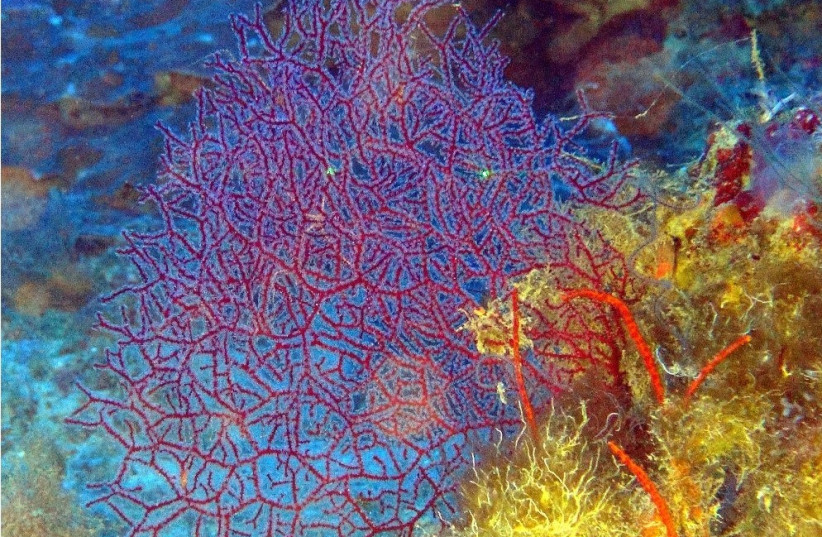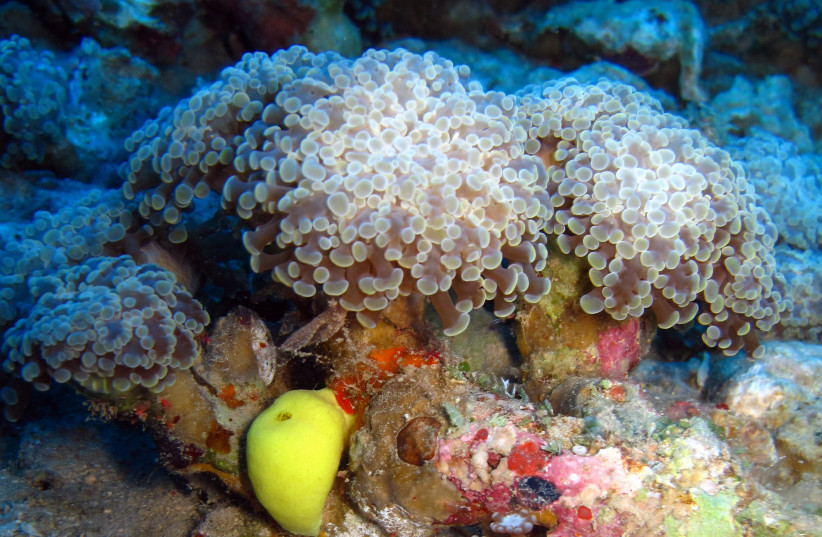Corals' biological clocks can function without algae - study
The biological clock is an internal and independent mechanism that dictates daily rhythm, thus enabling an organism to gauge daily and seasonal signals.
Marine biologists in Israel and abroad have been warning that coral reefs are doomed because of climatic changes and pollution. But new research at Bar-Ilan University (BIU) has revealed that the biological clock of corals can function even without the algae that serve as their food.
The biological clock is an internal and independent mechanism that dictates daily rhythm, thus enabling an organism to gauge daily and seasonal signals and live in synchrony with the rhythm of nature, while maintaining timing capabilities that are essential to carrying out important physiological and behavioral processes. For corals, this includes breaking down sugar and synthesizing fats, opening and closing their hunting tentacles, and more.
In the marine ecosystem, corals and algae maintain a symbiotic relationship – the corals provide algae with shelter and carbon dioxide, while algae, through photosynthesis, supply corals with food and nutrients vital to their survival. This give-and-take relationship, which is largely dependent upon synchronization and coordination, likely requires “cross-talk” between the biological clock of the coral host and that of the symbiont algae.
Coral Reefs 101 National Geographic
As rising sea temperatures and increasing bleaching events cause corals to lose their algae and die, researchers are seeking to find out exactly how this biological mechanism works and whether corals can survive without the presence of algae for a period of time. This is important for understanding which species might be “winners or losers” in continued episodes of heat waves. The BIU researchers have now discovered one species of “winners.”
The coral species known as Euphyllia paradivisa has been shown in previous studies to be tolerant of bleaching conditions and can survive without algae during prolonged darkness. In a paper recently published in the journal Science Advances, the BIU team documented the biological clock of this species for the first time and confirmed the assumption that their biological clock functions without the presence of algae – even at a depth of 65 meters underwater and in almost complete darkness.

How did the scientists arrive at their findings?
DR. MIEKA RINSKY from BIU’s Goodman Faculty of Life Sciences led a team of researchers that transferred abundant E. paradivisa from their marine environment in the Red Sea Gulf of Eilat to a lab at the nearby Inter-University Institute for Marine Sciences.
The corals were placed in aquariums into which seawater from their natural habitat was pumped. Half of the samples were kept under ambient light and dark cycles, while the other half were kept in complete darkness for a year, triggering a bleaching event to generate aposymbiotic corals (ones that live apart) and causing the algae to be expelled from the host tissue.
After a year, the biological clock performances in a high number of replicates of symbiotic and aposymbiotic healthy coral colonies were investigated. Following 48 hours of exposure to light/dark cycles and complete darkness, the bleached and unbleached corals were compared. E. paradivisa revealed a biological clock operating on a 12-hour rhythm, guided by tidal cycles and influenced by symbiotic algae.
But even more astounding was the discovery that the corals maintain an independent biological clock that controls the timing of their essential metabolic processes. This clock operates on a 24-hour schedule, influenced by light and darkness, similar to that of humans, and functions independently from the algae's clock. Even in their so-called “twilight zone” – 65 meters underwater and in almost complete darkness – the corals can survive harsh conditions and maintain their resilience without the presence of algae and the benefits yielded from photosynthesis.
“Most research about symbiosis shows that corals die once they’re bleached. Here we’ve found a species that can survive without algae,” Rinsky said from Bar-Ilan's Laboratory for Molecular Marine Ecology directed by Prof. Oren Levy.
“The corals’ biological clock can operate without daily changes in oxygen and nutrients in its tissues that typically results from the presence of their symbiotic algae and, hence, photosynthesis."
"Corals have a certain ‘plasticity’ that enables them to shift between different rhythms and survive detrimental situations such as bleaching caused by changes in the environment."
Prof. Oren Levy
The fact that the biological clock functions independently of algae allow corals to deal with stressful situations and maintain their daily metabolic and physiological processes. These findings provide a ray of hope for their ability to survive extreme heat.


No comments:
Post a Comment
Stick to the subject, NO religion, or Party politics